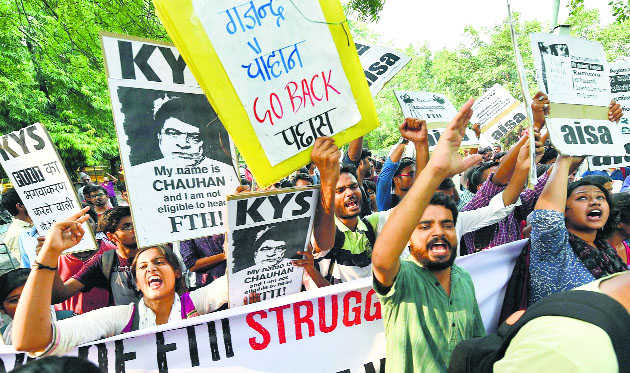It is the lull after the storm. The 139-day strike called by students of the Film and Television Institue of India (FTII) was officially over on October 28. Yet, the tell-tale signs are visible. The graffiti that came after students began protesting appointments to the FTII panel, and particularly of Gajendra Chauhan as the chairperson, has yet not been whitewashed and carries forth their angst. The words of Albert Camus read loud and clear, “The only way to deal with an unfree world is to become so absolutely free that your very existence is an act of rebellion.”
While walls echo their deeply hurt sentiments, in yet another corner of the institute, a short film is being made. Naina Sareen, a final-year student of acting, is excited to have canned a small part in an independent film on an HIV patient. She is equally excited that the FTII has reopened.
Victory or defeat, or a tactical retreat, the students who held their ground for months at a stretch have decided to give precedence to their academic careers. Classes have begun in India’s premier film institute, though of course classes do not follow the conventional structure. Or perhaps these are in accordance with the good old guru-shishya parampara. For, wasn’t it under a tree that Bengali filmmaker Ritwik Ghatak, by the way considered a greater cult figure here, would take classes? That tree today occupies prime significance, known as the ‘tree of knowledge’. Close by, another tree carries a piquant name: ‘tree of ignorance’. Shardul Bhardwaj, a final-year student of acting, reveals why: “Go and sit behind it and the world will cease to exist.” However, these youngsters are not ready to lock themselves in ivory towers, oblivious to the world pass them by.
Cinema may not be overtly political but making art is a political activity. Locking horns with the establishment might have come at a heavy price, but it is not something they lament. So, what made them call off the strike? The answer is cryptic: “139 long days.” Meaning, this was only so much that they as students could sustain. Naina feels, “We should have backed down when we went to Delhi to meet the ministry officials.” The ministry’s response, in fact, has the student leaders flummoxed.
Vikas Urs, a cinematography student who was one of those arrested in the infamous midnight swoop and then released, says, “I met the ministry representatives nine times. It seems the ministry doesn’t have the mandate to take decisions.” Perhaps, but is it within their right to choose who will head the institute? Shouldn’t they have given Gajendra Chauhan a chance before letting all hell break loose? Says Bhardwaj, “When the rules demand that he should be an eminent person, how can they choose a man of mediocre caliber? Will they give students a chance if they are not meritorious?”
While the constitution of the panel, with four appointees owing allegiance to the RSS, is a major bone of contention, what piques them equally is the ministry’s “flawed” understanding of the FTII. Bhardwaj says, “They consider it the manufacturing unit of Bollywood.” Chips in Ajayan Adat, a student of sound design, “They treat the FTII like the media wing of the Information and Broadcasting ministry, yet another extension of government departments. They can’t differentiate between FTII and Doordarshan.”
Yes, Chauhan’s appointment is not the only thing that ails the FTII. Adat agrees that there are other issues such as infrastructure. Since the number of students has increased, it has put pressure on the existing studio where they make their films. Belonging to the contentious 2008 batch, there is also the question of syllabus revamp. Adat, who was a member of the syllabus review committee, reminds how unlike other colleges, FTII students play a huge participatory role in the institute’s administration and this involvement can neither be undermined, nor overlooked
Where do they go from here? For now, they have neither gained, nor conceded any ground. But if the government is hell-bent on casting a saffron shadow on the institute and on cinematic quality as well as the freedom of expression, they too are not letting things be. Protests, they stress, will continue, only the modus operandi will change.
While the film fraternity was always with them, now with Dibakar Banerjee and other FTII alumni standing behind them, they are emboldened even more. Why, even King Khan has openly supported them and remarked, “What’s happening is completely wrong, it’s extremely disturbing.”
Yes, they nod, “FTII may never be the same again”. For better or worse, time will tell. But, in an institute that was once the famous Prabhat Studios, the place where each corner tells a story, yet another legendary tale could be in the making. In the later hours of a Sunday evening, the famous Shantaram pond lies empty, but emotions are flooding their hearts and minds.
Whether life’s lessons learnt here translate into celluloid magic someday or not, the students’ education is complete. As William Butler Yeats said, “Education is not the filling of a pail, but the lighting of a fire.” And the students have not only stoked the fire within, but also forced the film fraternity to ask questions and question the powers-that-be.
nonikasingh1@rediffmail.com
Unlock Exclusive Insights with The Tribune Premium
Take your experience further with Premium access.
Thought-provoking Opinions, Expert Analysis, In-depth Insights and other Member Only Benefits
Already a Member? Sign In Now










